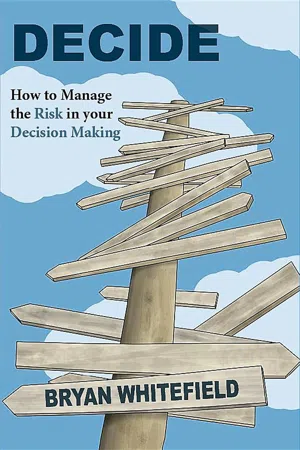![]()
Chapter 11
Smarter decisions
By now I am assuming that you have a pretty clear picture of the key flaws in decision making and you are interested in learning new ways for making smarter decisions and consequently developing smarter strategies. I have written about a number of traps to avoid and have given some suggestions for how to do the hard-smart work and what to consider when implementing key strategies. In this last part of the book I will provide you with a formula for decision making, and for identifying the type of strategy you should be designing for any given situation.
Do you remember the statistics I gave you at the beginning of the book? Paul C. Nutt, in his book Why Decisions Fail unpacks decades of research into nearly 400 decisions by strategic leaders and found the success rate was about 50 percent. That is no better than chance. I also quoted some statistics from the systems-reliability engineering field that suggested for tasks that require a high level of comprehension and skill, the success rate is only 86 percent.
Think of the fall-out and rework that comes from getting 14 percent of your decisions around complex tasks wrong. Think of the wealth destroyed, the opportunities missed, by getting 50 percent of your strategic decisions wrong!
Decision making is a challenge. No question. There are no certainties in life. We cannot know all the possible consequences of our decisions. That doesn’t mean, however, that we can’t improve decision making.
What does improved decision making look like? Like life is a journey, so is the development of our decision-making skills. The old saying comes to mind, “You can’t put an old head on young shoulders.” While, through life, we are exposed to a myriad of skills to choose from and learn, our decision- making journey improves our ability to select the best skills to acquire and develop. Deciding comes first. It is the single most important thing we do and we do it thousands, or even tens of thousands of times a day. Each day in our business lives we make a number of significant decisions. And on a less regular basis we are called on to make strategic decisions. Decisions that will lead to thousands or hundreds of thousands or even millions of decisions by staff, contractors, suppliers, customers and competitors, all of which you would love to control.
Of course, that sounds impossible and it is. What is possible, however, is to improve our decision making down to the one- millionth decision. Under the broad heading of governance, we have been on a journey of improvement of our strategic decision making and strategy implementation. However, if you look at better practice in governance, you will find the principles and guidelines thin on strategic decision making. Some don’t mention decision making as a key process, or role, for the board and senior management. Some mention it and call for “sound and well-informed” decision making. None I have found do more than acknowledge this need and mention the potential for bias that can come into a decision.
To deal with the potential for bias, the governance principles concentrate on executive and director remuneration and ensuring that there is a majority of non-executive directors on the board. They encourage remuneration arrangements for executives to be in line with the amount of risk taking the board desires. They also warn against options that will influence, or drive heavy risk taking to achieve the strike price for a big win, only to see the organisation crash shortly afterwards. They encourage arrangements for non-executive directors that are either a fixed-annual payment or fixed-plus shares, no options. This allows them to be more objective. And, with a majority of objective non-executive directors it should give the board the opportunity to make the best decision for the organisation, not for the directors or executives.
While this approach goes some way to addressing a major threat to decision making – that is, the potential for bias in people’s decision making – it by no means goes far enough. It does not adequately address the actual decision-making process. While the governance principles express the need for informed decision making, they do not provide guidance on what that actually means. To me, it means having a process that allows you to feel confident that you understand the risk in your decision making and that you have managed that risk to the best of your ability with the means available. If you have done that, you will have done more than pass the reasonable- person test used in corporations law. You will have impr...
